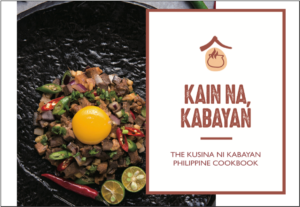Philippine culture and spiritual faith are closely related, and this is reflected in an innate Filipino trait, being masambahin (worshipful). For example, various towns across the archipelago celebrate festivals in honor of patron saints, while Sundays are usually reserved for religious services.
For many overseas Filipino workers (OFW), their strong spiritual faith has helped them survive abroad. Such is the case for Mary Grace Gacosta, who hails from Bulacan, a province roughly three hours away by car from Manila.
Grace resides in Quanzhou, Fujian with her Chinese husband and their three children. She has been living in China for more than 14 years, but her faith has never dwindled and has always served to strengthen her.
Grace established Pan de Gracia, her bread and pastry business venture, because of a simple craving. She recounts, “It was the winter of 2017 and my Filipino friends and I wanted to have coffee and pandesal, which isn’t available in Beijing. So even if I didn’t know how to bake, I still bought an oven and tried out various recipes, from pizzas to cakes. All of them, sadly, didn’t work out.”
Those failures did not stop her from creating baked goods but only motivated her to perfect her craft by watching YouTube videos and reading cookbooks. It took her half a year to bake fluffy pandesal reminiscent of the ones she had in her home province.
She served these pandesal first to her home guests, who were impressed by the taste of the bread. They eventually convinced her to start the Pan de Gracia brand and take the business online. But Grace herself was unsure if she could support her venture.
“At that time, I was applying for an English teaching position at a local school, but they required someone who could sing as part of the learning activities for children. I couldn’t sing, so they turned my application down. That was the time I thought, ‘This may be God’s sign that I need to focus on my business.’”
Two years after she baked her first bread, which she says were “as hard as rocks,” her baked goods are now sought after in the Filipino community in Fujian. Her booming online bakery has also received rave reviews and praises from her customers in southern China.
“At first, it was difficult for me to market my items because of the language barrier. But my Filipino friends who have foreign spouses spread the word about my bakery and now, I have customers from the US and Italy who said they liked my baked goods so much. Filipino customers tell me my products make them feel like they were home.”
Grace says her dedication links her to her faith, which has allowed her to look at the positive side of struggles and failures.
“I was born on a Good Friday, and my grandmother told me there was a religious procession in front of our house at the moment when mom gave birth to me! That’s why they named me ‘Grace’ because it means biyaya or ‘blessing.’”
Grace shares these blessings with everyone through the three bread recipes she created for the Kain na, Kabayan! cookbook.
First on the list is Pinyadesal, a combination of a local lightly salted breakfast bun called pandesal and pinya or pineapple. Her second recipe is Mamon Macapuno, her own version of mamon blended with macapuno or coconut sport. This sweet product, which originated in her native Bulacan, is also associated with a chewy delicacy of the same name commonly eaten by religious followers during town festivals. Her last recipe is Buko Ensaymada, a version of the ensaymada or a brioche bread baked with butter. This bread is readily available in local bakeries, but Grace’s variant contains coconut, which enhances the bread’s sweetness.

This article first appeared in the Kain na, Kabayan: The Kusina ni Kabayan Philippine Cookbook.
Email kusinanikabayan@gmail.com to get your copy.
Co-written by Abhigail Gatdula-Xu
Photos: Kusina ni Kabayan
